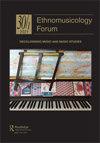在房子外面,没有法律:Shona kurova guva仪式的音乐练习和仪式动态
IF 0.5
1区 艺术学
0 MUSIC
引用次数: 0
摘要
在津巴布韦,讲绍纳语的人普遍举行kurova guva仪式,以使已故的家庭成员作为祖灵或vadzimu重新融入父系。在葬礼一年后进行,kurova guva涉及到一种异质的音乐环境,将其与津巴布韦音乐文献中描述的其他仪式事件区分开来。由传统主义者和几个基督教教派的成员举行的仪式也有力地提醒人们,土著仪式仍然是当代津巴布韦经历中充满活力的一部分。我说明了音乐是如何在kurova guva仪式实践的中心模式,在那里它被认为是仪式上有效的,使参与者能够收回死者的精神作为一个血统祖先。与此同时,我认为音乐实践也参与了黑舌仪式轮廓的不断重新协商、表达和社会生产。通过音乐的空间和时间维度的协商,我展示了kurova guva的参与者如何表达仪式过程核心的结构模糊性。我的分析表明,话语期望和实际音乐体验之间的差距构成了民族音乐学分析的生产场所。本文章由计算机程序翻译,如有差异,请以英文原文为准。
Outside the house, there are no laws: musical practice and ritual dynamics at Shona kurova guva ceremonies
ABSTRACT In Zimbabwe, the ceremony known as kurova guva is widely held by Shona speakers in order to reintegrate deceased family members within the patrilineage as ancestral spirits, or vadzimu. Conducted a year after burial, kurova guva involves a heterogeneous musical environment that distinguishes it from other ritual events described in the literature on Zimbabwean music. Held by traditionalists and members of several Christian denominations, the ceremony also offers a potent reminder that indigenous ritual remains a vibrant part of the contemporary Zimbabwean experience. I illustrate how music is a central mode of ritual practice at kurova guva, where it is considered ritually efficacious in enabling participants to reclaim the spirit of the deceased as a lineage ancestor. At the same time, I suggest that musical practice also participates in the continual renegotiation, articulation, and social production of the ritual contours of kurova guva. Through the negotiation of music’s spatial and temporal dimensions, I illustrate how participants at kurova guva express the structured ambiguity at the heart of ritual process. My analysis suggests that the gap between discursive expectations and actualised musical experience constitutes a productive site for ethnomusicological analysis.
求助全文
通过发布文献求助,成功后即可免费获取论文全文。
去求助
来源期刊

Ethnomusicology Forum
MUSIC-
CiteScore
1.10
自引率
25.00%
发文量
29
期刊介绍:
Articles often emphasise first-hand, sustained engagement with people as music makers, taking the form of ethnographic writing following one or more periods of fieldwork. Typically, ethnographies aim for a broad assessment of the processes and contexts through and within which music is imagined, discussed and made. Ethnography may be synthesised with a variety of analytical, historical and other methodologies, often entering into dialogue with other disciplinary areas such as music psychology, music education, historical musicology, performance studies, critical theory, dance, folklore and linguistics. The field is therefore characterised by its breadth in theory and method, its interdisciplinary nature and its global perspective.
 求助内容:
求助内容: 应助结果提醒方式:
应助结果提醒方式:


